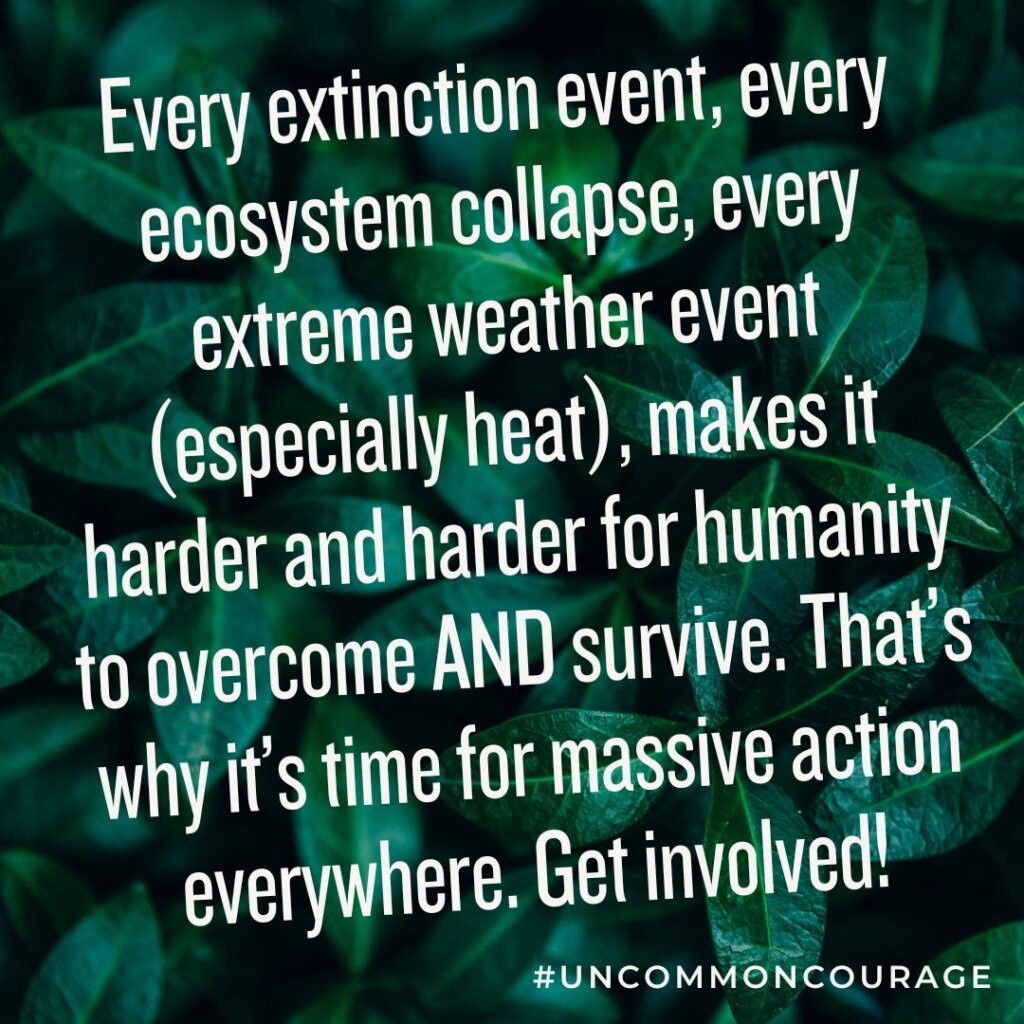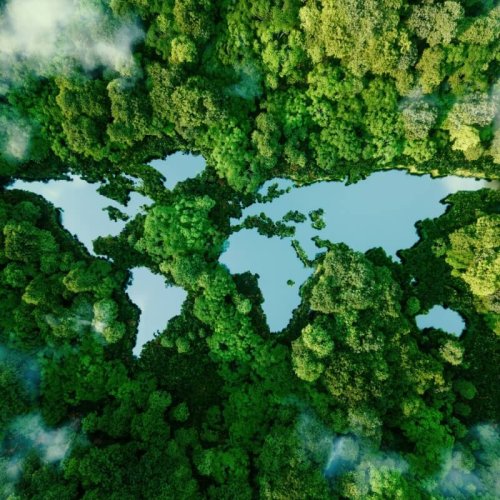Mass die-offs are being reported at a rapid rate these days, and the numbers are escalating. One has to wonder – how many mass die-offs or extinctions are we willing to accept before we do something about it? How many ecosystem collapses do we think we can tolerate? Because the point of no return isn’t too far away now. We must act urgently in every possible way.
If you know me, you know I collect news. I know – weird – but hey, someone’s gotta do it. So, here’s about six months’ worth of articles I’ve put together, to illustrate the situation we are in from a mass die-off/extinction/ecosystem collapse perspective.
This collection began in August 2023, when we heard of a catastrophic die-off of emperor penguin chicks in the Antarctic, with up to 10,000 young birds estimated to have been killed. The sea-ice underneath the chicks melted and broke apart before they could develop waterproof feathers, which are needed to swim in the freezing ocean.
After this, we heard pink river dolphins are dying from extreme heat in the Amazon, following months of high temperatures and low rainfall, which is taking its toll on both the wildlife and the people living along the Amazon river. Even more extreme conditions have happened since then, are we noticing?
But let’s come forward and then go backwards. Here’s a quick summary of what I’ve found. It’s not everything, but it paints a picture.
Do you like Tequila? Well, we better make sure the bats are ok!
Avian influenza or bird flu, is killing tens of thousands of seals and sea lions in different corners of the world, disrupting ecosystems and flummoxing scientists who don’t see a clear way to slow the devastating virus.
Thousands of dead fish have been found in a Minnesota lake at the same time all its ice has melted. Why? Well, because of unusually mild temperatures.
New research has uncovered a massive decline in the North Pacific population of humpback whales between 2012 and 2021, which coincided with the strongest marine heat wave recorded globally.
Our coral reefs are in big trouble, and right now, the entire Southern Hemisphere is on the verge of a fourth mass coral bleaching event which could see wide swathes of tropical reefs die, including parts of Australia’s Great Barrier Reef. Ecologist Derek Manzello said: “It’s looking like the entirety of the Southern Hemisphere is probably going to bleach this year.”
In Australia, the Great Barrier Reef is experiencing its fifth bleaching event in eight summers – the corals now have almost no reprieve.
The Amazon is on fire like never before, and it’s threatening the collapse of the Amazon Rainforest. When we lose the Amazon, we lose the diverse and abundant life within the forest.
Research shows that marine heat waves in the northeast Pacific Ocean create ongoing and complex disruptions of the ocean food web that may benefit some species but threaten the future of many others, and it’s only gotten hotter since the time referenced in this report.
Piles of dead shrimps/prawns have washed up on the coast of Yemen and there are two possible reasons – the sinking of the British cargo ship Rubymar, which had 20,000 tons of fertilizers that included ammonium sulphate and phosphate. Or it may be from natural causes associated with a severe change in water temperature or a lack of oxygen dissolved in water.
In Australia, creatures are quietly going extinct before anyone can describe and name them – frogs, snakes, insects and spiders. The current rate of extinctions is thousands of times higher than what’s natural.
In Africa, birds of prey are under threat of extinction. Boasting more than 100 species of raptors, all are experiencing decline. The reasons? Rapid human and agricultural expansion, as well as habitat alterations and poisoning. But it’s not just scavengers, all large raptors are being impacted.
In California, hundreds of thousands of fall-run chinook salmon have died following release into the Klamath River. The deaths were caused by gas bubble disease, which occurs when fish experience a drastic change in pressure.
The magnificent horseshoe crab is under threat from overharvesting and the worst part is, we don’t even need to harvest these anymore. The crabs’ blue blood is used to test vaccines, which has saved millions of lives, however today we have synthetic alternatives, so it’s completely unnecessary.
A bucket list item for me is to see the monarch butterflies in the Mexico wintering sites, however the numbers have plummeted by 59% to the second lowest level since record keeping began.
Bird populations, even common species, are experiencing dramatic population crashes – this is for the US.
In Australia, bird experts say bad weather and ocean warming are possible reasons for hundreds of short-tailed shearwaters washing up on New South Wales beaches.
A group of researchers witnessed firsthand how coral reefs that were healthy and vibrant just two months earlier had quickly deteriorated. Between 90% and 95% of corals they surveyed at 76 sites across the Keys and Dry Tortugas showed signs of extreme bleaching, with endangered branching corals like staghorn and elkhorn, nearly all dead.
The International Union for Conservation of Nature (IUCN) reports that 44,000 species are threatened with extinction. All species have been added to the Red List of Threatened Species, which makes up 28 percent of the 157,190 species listed.
In the US, 21 US species were declared extinct in 2023 – Hawaii lost eight birds, we lost the Ohio catfish, a Pacific fruit bat and eight freshwater mussels.
In Indonesia, a species of ray, so rare it has only ever been recorded once back in the late 1800s, has been declared extinct after an assessment by an international team led by Charles Darwin University. The loss of the Java Stingaree, a small relative of stingrays, is the first marine fish extinction because of human activity.
Climate change is causing plants and insects to fall out of sync – 60% of insects are already struggling to keep up with the plants they rely on because climate change is advancing key seasonal timings (phenology), such as plant blooming or insect emergence, earlier in the year, at different rates.
Not even the moss is safe. In the Tibetan Plateau we have a rare moss called Takakia, which has adapted over hundreds of millions of years to survive the extremes of life on the cliffs. Unfortunately, today, Takakia may not be adapting quickly enough to survive climate change.
The world is on track for 2.5-2.9°C of global warming, and once we breach 2°C warming, well the current trickle of extinctions will become a flood.
Nearly a quarter of the world’s freshwater fish are at risk of extinction due to global heating, overfishing and pollution.
In Japan, thousands of tonnes of dead sardines washed up on a beach in northern Japan for unknown reasons.
In Australia, scientists discovered three new species of marsupials, but they are already extinct.
Millions of young birds are dying from extreme heat in farms across the US and researchers say this growing threat from climate change could affect avian populations.
Eastern oysters, northern quahogs, softshell clams and northern bay scallops numbers have dropped sharply, and it’s not due to overfishing, but because of warming oceans, specifically due to the North Atlantic Oscillation (NAO).
In the Caribbean, extreme ocean temperatures are threatening to wipe out Caribbean coral. Reported back in October 2023, the entire Caribbean was bleaching.
Amazing story, Krill provide US$8.6 billion of carbon storage via their pooh! Dr Emma Cavan suggests krill should be valued beyond their worth as a fished resource.
In the US, Climate change is pushing the Sonoran Desert to the brink, with saguaro cacti seen as a bellwether of the impending disaster.
Scientists estimate that more than 5 billion sunflower sea stars have died in the Pacific Ocean because of warming waters. The Nature Conservancy estimates that 5.75 billion sunflower sea stars died over the span of three years, which is a 94 percent global decline.
The unusual deaths of hundreds of West Coast gray whales has been linked to lack of Arctic ice. They are starving to death.
Billions of snow crabs have disappeared from the ocean around Alaska in recent years, and it’s due to warmer ocean temperatures causing them to starve to death.
Chum Salmon are spawning in the Arctic and this is not good – it’s a sign of dramatic warming and ecosystems transforming at a rapid rate.
In the Caribbean, Dominica’s mountain chicken frog faces disappearance in ‘fastest track to extinction ever recorded.’ It’s an ecological calamity, demonstrating how quickly wildlife can be destroyed.
In Mexico, the axolotl is at risk, with pollution reducing its population density by 99.5%, but scientists are working hard to save these beauties.
The much-loved fish, Cod, has been at risk from overfishing, but there’s now a new risk, rising ocean temperatures, which are inhibiting the fish’s ability to produce codlings at all.
And back to where it all started, the deaths of the Amazon River Dolphins and researchers are trying to determine if it is a sign that the “tipping point” has already been reached.

Conclusion
Grim reading I know, but that’s enough for now. As I hope you can see, it’s a very dire situation and while we (humanity) are at risk, all life on this earth faces this with us, and if we allow it to keep escalating, there will be nothing we can to do stop it. We need all people on this earth to come together and focus all our energy on turning this around.
However, rather than doing even a small part of what we need to do, we are going in the opposite direction. We continue to chop down the trees, overfish our oceans, and make the homes for our wildlife inhospitable for them to flourish. How we live, eat, dress, travel, work, etc… is out of balance with a healthy world and we really must turn it all around.
If you’re interested in the problem and solutions, I’m doing a series called: We need a new middle-class dream. Here is part one, and over the course of this series, I’m illustrating the scale of the problem and what we can do about it. Have a watch and let me know your thoughts.
The time to act was 50 years ago, but all we have is now. Our children and grandchildren deserve our best efforts to give them a healthy future. All other life on our planet deserves the same. Let’s work together and do this. We can not accept the dystopian hell we are heading towards, because if we do that, we will definitely have no chance at all.
Join me and the thousands of people around the world, who are all doing our best to change this trajectory. We have to try, we really do, but we need everyone on board.
The best solution I can see is we bring together One Billion People with Uncommon Courage who all act to drive the change we need to hit the human tipping point. Once we reach one billion people, we only need each person to recruit 3-4 people and then we will have enough people to be in a position to drive the run-away changes required. We also must believe we can do it and get to work.
Let’s do it. We can’t give up. We can’t despair. We must act with enormous urgency. That is where we need to be spending our time today.
Cheers
Andrea
All of my contact information is here.
Uncommon Courage, an invitation
Uncommon Courage is an invitation to be your courageous best self every day. It’s also an antidote to the overwhelm, fear, and rage rolling around the world. But it’s more than a book; it’s an invitation to join an inclusive community that wants to better understand humanities challenges – both global and personal – in order to take courageous action and create a better world for everyone. If Covid19 gave us the time and space to reflect, Uncommon Courage gives us the nudge we need to create lasting change.
You can buy it on Amazon, Apple Books, Barnes & Noble, Book Depository, Booktopia, Smashwords, Kobo, Gardners, Odilo, Indie Bound, BookShop by BookTrib and Scribd.
Better yet, order it from your local bookstore, so you can #SupportLocal.
You can read the reviews, including a new five-star review on Book Commentary, another five-star review on ReaderViews, a review on BookTrib, and three more on Booklife, another on Book Commentary and Blue Ink Reviews. I’m also collating reviews on my Website too. Have a look and grateful to everyone who has written or recorded one.
Come and join the conversation in my Facebook Group One Billion People with Uncommon Courage.
Listen in to the Uncommon Courage, the podcast on Apple, Spotify and everywhere podcasts are published.
The Know Show
Check out The Know Show. It’s a fortnightly wrap up of the news and we started again for 2024.
Climate Courage
A fortnightly conversation on issues that matter to you and I, focusing on the actions we can all take. I am yet to confirm the return date for this, but it’s coming. In the meantime, I’m doing a three-part series called: We need a new middle-class dream, and one billion people with Uncommon Courage!
18 Steps to an All-Star LinkedIn Profile
Listed by Book Authority in the 100 Best LinkedIn Books of All Time and 22 Best New LinkedIn eBooks To Read In 2021 and 2022 categories. Grab it today if you want to take your professional presence to the next level! When it comes to LinkedIn, it really is time to ask — can you really afford not to have this book in the hands of every employee?
Are you a Social CEO? The Social CEO: How Social Media Can Make You A Stronger Leader.
Want to claim your stage? Unleash Your Voice – Powerful Public Speaking for Every Woman
Feedback
Have I done a great job for you? Can you write a reference on my LinkedIn profile or on my Google Business page? If not for me, why not write one for someone else who inspires you or has helped you? Join the #GivingEconomy.




One Response